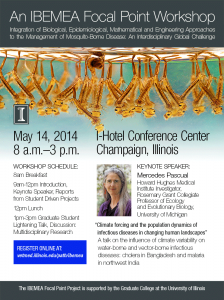 You are invited to attend a workshop on Wednesday, May 14th, 2014 related to water resources and mosquito borne diseases.
You are invited to attend a workshop on Wednesday, May 14th, 2014 related to water resources and mosquito borne diseases.
It is at the I Hotel Conference Center, 8am to 3pm. Please register if you plan to attend so that we can be sure the food is arranged.
This workshop is a forum to learn about and discuss the challenges and opportunities for multi-disciplianry education and research for improved water resource management to reduce mosquito-borne diseases. It is part of a Focal Point project sponsored by the University of Illinois Graduate College. The keynote speaker, Mercedes Pascual, from the University of Michigan, will speak about cholera and malaria in South Asia.
Register here: http://vetmed.illinois.edu/path/ibemea/
Registration is free.
Contact Marilyn O’Hara Ruiz if you have questions.
=======================================================================
Focal Point Workshop – Integration of Biological, Epidemiological, Mathematical and Engineering Approaches to the Management of Mosquito-BorneDisease
I Hotel and Conference Center, 1900 S 1st Street, Champaign, Illinois
14 May 2014
8am – Continental Breakfast and conversation
9:00 Welcome; Carla Caceres – Acting Director of School of Integrative Biology
Review of objectives and format for the day; by Marilyn O’Hara Ruiz
Introduction of keynote speaker – Mercedes Pascual; by Brian Allan
9:15 Keynote address followed by discussion and questions.
Climate forcing and the population dynamics of infectious diseases in changing human landscapes
Among infectious diseases, water-borne and vector-borne infections are those potentially most susceptible to climate forcing because of the environmental nature of their transmission routes. This talk presents two case studies on the influence of climate variability on such diseases, the first one on cholera in Bangladesh, and the second one on desert malaria in northwest India. Results illustrate the clear role played by climate variability as a major driver of the population dynamics of both diseases, while also underscoring the increasing need to understand this role in the context of changing human ‘landscapes’. For cholera, the influence of the El Niño Southern Oscillation (ENSO) and flooding is examined in the megacity of Dhaka. For desert malaria in India, the influence of rainfall is considered together with how this influence is modified by irrigation-baseddevelopment. Evidence is presented for a complex interaction between intervention levels and climate forcing in a long-lasting transition between rainfall-driven epidemics and sustainable elimination.
10:30 Break
10:45 Student activities from Spring 2014.
Phong Le, Surendra Karki, Trisha Rentschler – hydrological model for larval habitat
Allie Gardner, Iftikhar Haider – mathematical models and vector borne disease
11:30 Discussion session 1 – how do we approach problems that cross disciplines and responses?
12:00 Lunch
1:00 Graduate student lightening talks
2:00 Discussion session 2 – What are the particular challenges of working on complex problems such as mosquito-borne diseases? What have we learned so far?
2:50 Closing remarks
